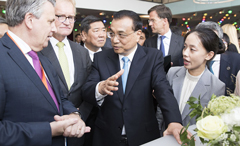Country to fine-tune its IPR policies
2018-11-07
China Daily
China will continue to revise its policies and regulations on intellectual property protection and implement stricter enforcement measures to further boost innovation and create a first-class business environment for both domestic and foreign companies, China’s intellectual property administrators said on Nov 6.
“The recent positive international assessment and the response from the market have shown that China’s efforts in improving the business environment and IP protection have paid off,” Li Chenggang, assistant minister of commerce, said at the 15th Shanghai International Intellectual Property Forum.
The Chinese public’s awareness of IP protection also has been significantly improved, Li said. An increasing number of people have the sense that they need to pay for intellectual property, he added at the event, held on the sidelines of the first China International Import Expo in Shanghai.
China paid about $28.6 billion to overseas IP holders in 2017 after experiencing an average annual increase of 17 percent in such expenses since 2001, Li said. The improved legal system for IP protection and firm enforcement also have stimulated enthusiasm for innovation among enterprises and the public, he said.
President Xi Jinping has indicated that innovation is a central element in the economic transformation of China.
Intellectual property is closely related to innovation. Intellectual property rights protect the competitive advantage conferred by innovation, which is translated into a comparative advantage for the country in international trade, said Francis Gurry, director general of the World Intellectual Property Organization, who attended the forum.
“China is now the second-largest filer of international patent applications after the United States. The number of applications is still rising at a very rapid rate,” Gurry said.
With China attaching great importance to IP protection, new challenges have also emerged, said Zhang Zhicheng, director general of the IP Protection Department at the National Intellectual Property Administration. Administrators are required to acquire more expertise to handle cases involving new industries and products to improve efficiency, he said.
“We need to improve legal procedures for handling IP cases, especially technical cases that are closely linked with innovation, so the plaintiffs can better present their cases with more evidence that can be accepted and protected by the court,” said Li Shulan, deputy director general of Shanghai IP court.


